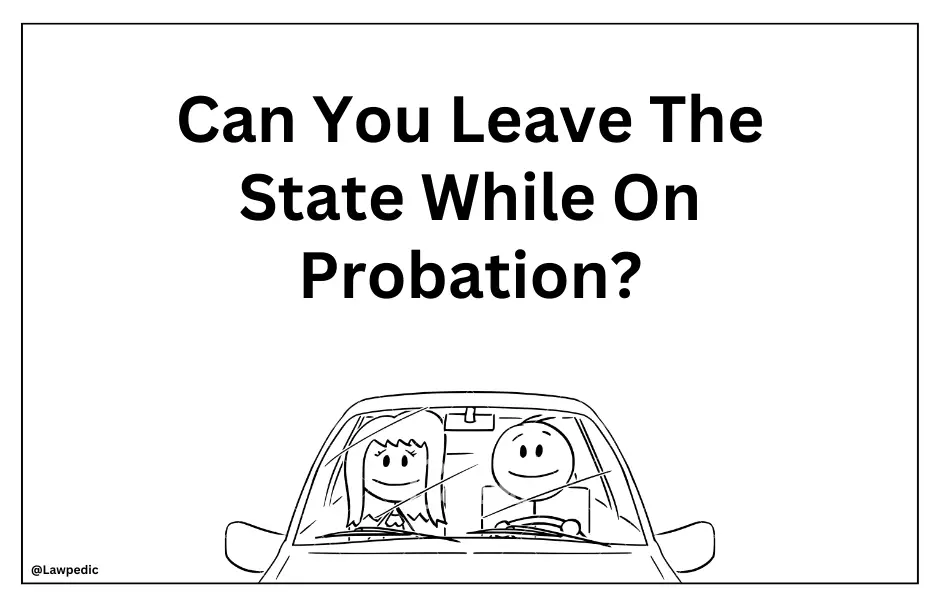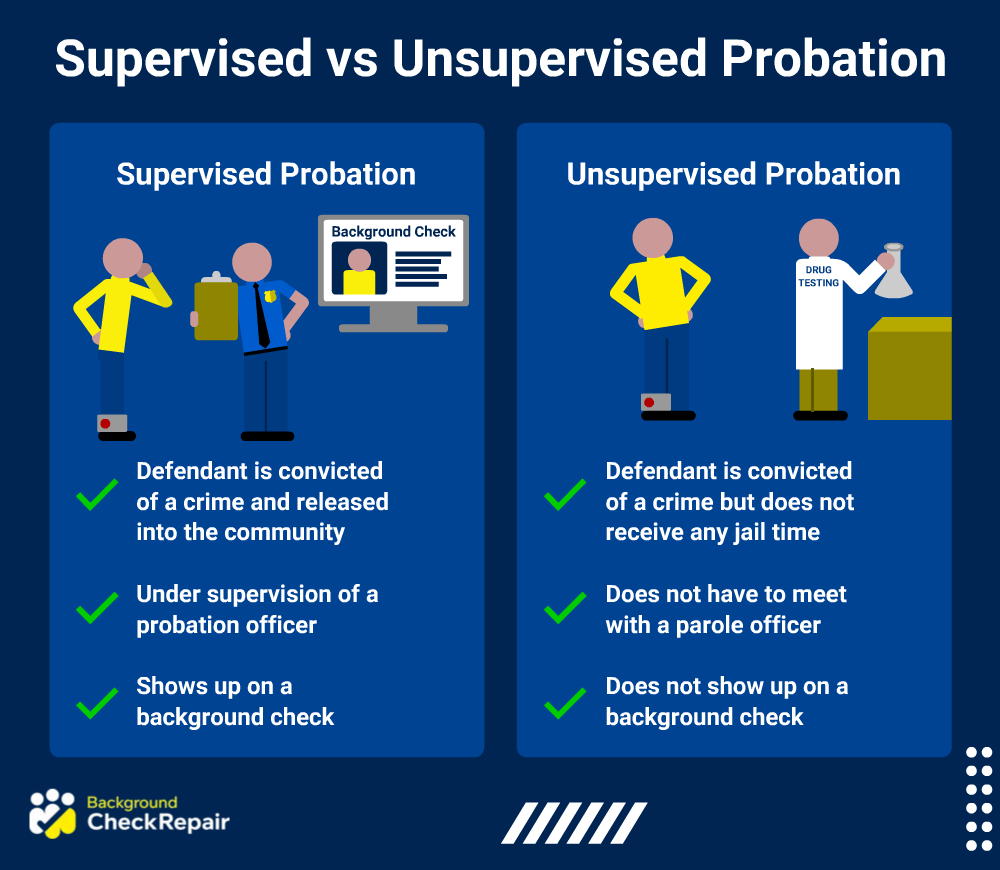Can You Leave The State On Unsupervised Probation? Learn Now!
Can you, or can't you, pack your bags and head out of state while on unsupervised probation? The answer, as with many legal matters, isn't a simple yes or no, and depends heavily on a web of conditions and jurisdictions. Navigating the terrain of unsupervised probation can feel like walking a tightrope, especially when travel plans enter the equation. This article will delve into the nuances of this frequently asked question, offering clarity and insight into the complexities of legal supervision.
In the realm of legal supervision, understanding the boundaries is paramount. Unsupervised probation, as the name suggests, doesn't involve regular check-ins with a probation officer. The court, however, still sets the stage, dictating the rules that must be followed. These stipulations, which vary by jurisdiction, can include anything from drug testing and maintaining steady employment to refraining from certain activities or associating with particular individuals. A person on probation, regardless of the level of supervision, is essentially given the chance to live in the community under a set of conditions, an alternative to the more restrictive confines of incarceration.
The crucial point to grasp is that even without the watchful eye of a probation officer, you're still under the court's purview. Violating the terms of your probation, whether through travel infractions or any other breach, can lead to serious consequences. These repercussions can range from a return to supervised probation to, in the worst-case scenario, jail time. Therefore, even the seemingly simple act of leaving the state requires careful consideration.
Each state has its own unique take on probation policies. Pennsylvania, for example, provides both supervised and unsupervised probation. A DUI offender might find themselves subject to work release or residential inpatient programs, further complicating the travel considerations. Similarly, in Alabama, probation can also be either supervised or unsupervised, each with its own distinct set of rules and regulations.
| Subject | Details |
|---|---|
| State Laws Regarding Probation | Laws about probation vary significantly by state and even by local jurisdiction within a state. Some states may permit interstate transfers of probation, others may require permission to leave the state. Even unsupervised probation usually comes with conditions to be adhered to. |
| Consequences of Violating Probation | Violating the terms of probation, like leaving the state without permission, can lead to serious consequences. These consequences can include:
|
| Steps to Take Before Traveling | If you are on probation and considering travel, you should always:
|
| DUI and Probation Considerations | DUI offenders may have additional restrictions, such as work release, residential programs, or specific travel limitations. You must always follow the specific conditions related to your DUI probation, and follow them, as set forth by the court. |
| General Rules to Follow | When on probation:
|
For more details on these topics, you can visit the official website of the United States Courts.
The core of unsupervised probation lies in its name: lack of direct oversight by a probation officer. The judge establishes the conditions, and the individual is expected to adhere to them independently, without the regular check-ins. However, this doesn't automatically equate to unbridled freedom of movement. The devil, as they say, is in the details. Even seemingly minor offenses can carry probation terms. And violating these terms, including those related to travel, can have significant repercussions, possibly including a transition to supervised probation or, in the most serious instances, incarceration.
Many jurisdictions understand that circumstances change. Moving out of state is a possibility for individuals on unsupervised probation, but it demands diligent adherence to the rules. Often, the courts will be amenable to allowing individuals to check in remotely, particularly via phone, if they are relocating. The paramount step is to proactively contact the local probation department or consult with an attorney to fully comprehend their specific policy.
The conditions of probation form the basic expectations for an individual's conduct while under supervision. They provide the framework that helps probation officers stay informed, report to the court, and ideally, help individuals improve their behavior. For those in Arizona, the possibility of an interstate compact probation transfer should be explored if permanent relocation to another state is desired.
The crucial thing to note is that a blanket "yes" or "no" doesn't apply. The specific terms of the probation order, the nature of the offense, and the state's regulations all play a role. For example, in California, those with misdemeanors may be placed on court probation, which is unsupervised and requires only minimal compliance, such as paying fines and avoiding further arrests. This simplified version of probation might offer more freedom to travel. However, even in these cases, it's vital to double-check the court's stance on out-of-state travel.
If your probation falls under a city or municipal court case, you might find more flexibility, but seeking explicit approval is always the wiser course of action. This caution is especially pertinent when it comes to leaving the country. Remember that the legal system can be unforgiving. Missing a court date due to travel mishaps can lead to severe complications. Before embarking on any trip, particularly international ones, ensure you have permission in writing.
Moreover, probation is not a monolith. A seemingly unsupervised status may still involve certain parameters. Even if you're not physically meeting with a probation officer, there could still be conditions that limit your ability to travel. This highlights the importance of thoroughly reviewing the specifics of your probation order.
Navigating the complexities of unsupervised probation requires careful attention. Understanding the conditions of your legal supervision is the first step. Probation serves as an alternative to incarceration, allowing individuals to remain within the community under precise guidelines. Violating these conditions can lead to substantial consequences.
In some instances, it might seem that your probation offers significant freedom. Without explicitly stated travel or residency limitations, moving out of state might seem permissible. However, even in such cases, its best to confirm any such move with the relevant authorities. This is particularly true for a DUI case. Seeking the advice of an attorney familiar with DUI cases in your area is recommended if you are also seeking an unrestricted driver's license.
If you are on probation or parole, you should always consult your parole/probation officer for permission before leaving the state. In the case of a DUI, permission from your probation officer is necessary for interstate travel, and a denial of permission means that you cannot leave the state. In such instances, consulting with legal counsel is advisable. Furthermore, it is crucial to be aware of the destination country's entry policies as well as to ensure a smooth return to the United States.
In essence, the rules of unsupervised probation may vary by jurisdiction, but a few core principles remain constant:
- Review your probation terms meticulously.
- Seek clarification from your local probation office.
- Always update your address with the court if you relocate.
- Get permissions in writing.
Unsupervised probation provides greater flexibility than its supervised counterpart. However, the potential for travel restrictions still exists. While you might have more leeway than someone under strict supervision, you must adhere to your court orders. The key to successfully navigating this landscape is clear communication and diligent attention to detail. It is also important to maintain a positive attitude and to avoid any actions that could result in a violation of your probation terms.


